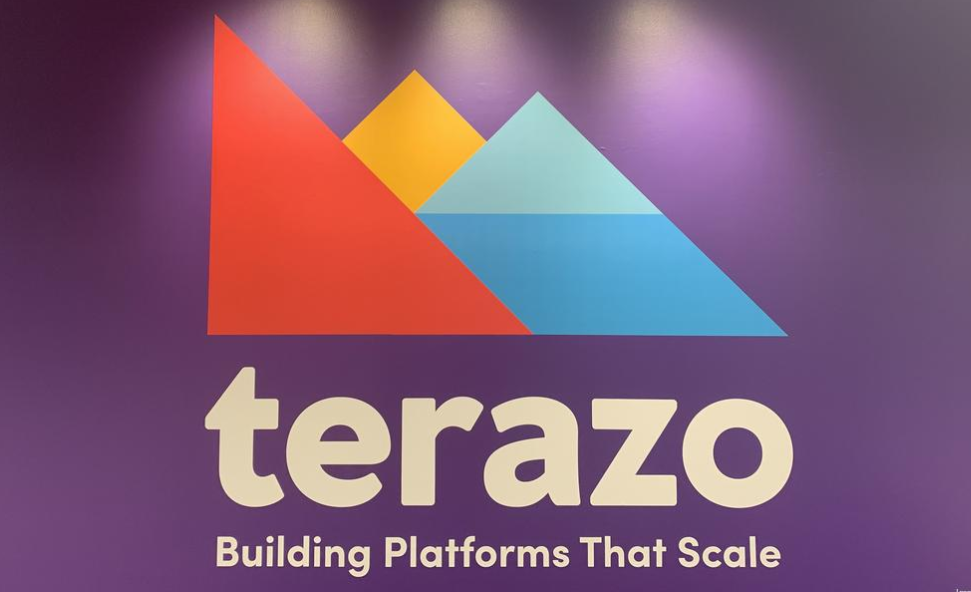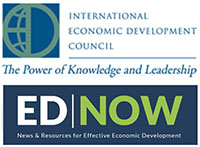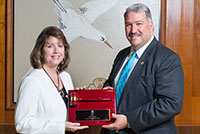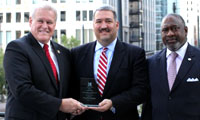
News
News | 6 min read
January 6, 2016


Barry I. Matherly, CEcD, FM, is president and CEO of the Greater Richmond Partnership in Richmond, Virginia. He recently spoke to ED Now about his experience as an economic development professional and his priorities as chair during the coming year. The interview has been edited for length and clarity.
How did you get started in the profession?
I was working in management at a Fortune 500 company and in my spare time volunteering at a local community development group. One day I came to an epiphany, when I realized that I enjoyed my volunteer work much more than my day job. So, I started talking to community and economic developers about opportunities in the profession.
I quit my job and went back to school to get my master’s degree at Virginia Tech in urban in regional planning with a concentration in economic development. I got my first economic development job at the university’s Economic Development Assistance Center. Ever since then, I’ve been a life-long learner in the profession.
I’m always trying to keep myself up to date, trying to learn more, and trying to get better at my job. IEDC provides a path of life-long learning and a forum in which new ideas and innovations can come forward. I’m learning new things every year, and I’m sure I’ll have learned even more when my chairmanship is concluded.
What are your priorities as board chairman in 2016?
This year is the 90th anniversary of the founding of one of IEDC’s predecessors, the American Economic Development Council. To celebrate, we’re declaring 2016 as the Year of the Economic Developer. We’re going to celebrate the profession and the professional. Economic development groups come in all shapes in sizes, from one-person shops to highly sophisticated organizations. The Year of the Economic Developer will showcase the diversity of the industry. The point is to focus back on why we have an association and the reason IEDC exists in the first place: to support the local economic developer. Without them, there is no IEDC. 
Also, we’re designating the second week in May as Economic Development Week, which will serve to raise awareness of the profession and highlight all the things economic developers are doing to improve their communities. We can do a lot to support economic developers just by raising awareness and by creating a more positive environment for them. Economic Development Week also will be a way to help dispersed professionals celebrate together.
We also want to tell some stories about economic developers – what’s going on in their communities, what projects they’re working on, and what support they need to be successful. That’s why each week in 2016, IEDC will profile a notable economic developer in a year-long series. 52 Weeks of Economic Developers will present interviews with a variety of professionals, ranging from industry veterans to young professionals, urban to rural, and minorities and women.
I’m also excited to carry on immediate past chair JoAnn Crary’s work on equity and economic opportunity. IEDC’s Economic Development Research Partners (EDRP) program will be undertaking a paper on this topic, which we’re looking forward to. Once again, it will be a new innovation and learning opportunity for the profession, as we think about how economic developers can bring opportunities to communities that have been neglected. Additional EDRP papers on infrastructure and other topics will be released this year, which, as a life-long learner, very much excites me.
Will you talk more about why it’s important to raise the profile of the profession?
A lot of the work economic developers do is in the background, away from the public eye. At the end of the day, most of the major announcements are made by elected officials – the mayors, county commissioners, governors. They’re the ones in the photographs, while it’s often the economic developer who’s holding the camera. What the public sees is the ribbon cuttings and groundbreakings. What they don’t see is the months or years of work the economic developer did to get that project to completion. With the Year of the Economic Developer, we’re going to put the spotlight on the people doing the front-facing work with companies.
How has the profession evolved since you started out?
Economic development has changed so much. It’s amazing what the profession is learning about itself. It’s still growing, and we uncover new things about ourselves every year. 
It’s incredible what technology has done for the profession. When I started in economic development, laptops were a novelty. If we wanted to go remote we’d have to load the computer monitor, screen, and CPU in the backseat and spend a half hour reassembling it on site. I’m especially marveled by GIS technology. It’s just phenomenal what professionals with GIS skills can do to tell a story about a community or to make a business case. And then you have all the advances in websites and social media – it’s been night and day since I started out.
That goes back to why you have to be continuously learning, because if you don’t, you’re just going to get left behind. Without continuous improvement, you’re not going to make it to the end of your career.
What do you enjoy most about your job?
I like the fact that you can actually see the improvements that your work does for the community. It’s really satisfying to be able to walk through an office building or manufacturing plant, look at the people there and know that the reason they have a job – to some extent – is a direct result of your work.
I think economic development is truly a noble profession. We try to help people help themselves by providing opportunity. I think as a profession, we need to be proud of that and of the contributions we make to our communities. At the end of the day, you can make decisions that result in people getting jobs. Looking forward, I see mostly opportunities for the profession. We have the chance to make the economic developer even more of a trusted advisor in his or her community.
Republished with permission from ED NOW, the International Economic Development Council’s electronic newsletter